Saturday, November 16, 2024 09:36 PM
Modi's Historic Visit to Kyiv Reinforces India's Strategic Autonomy
- Modi's visit marks first by an Indian PM to Ukraine.
- India maintains neutrality amid Ukraine conflict.
- Bilateral trade with Russia surged to $65 billion.
 Image Credits: thefrontierpost
Image Credits: thefrontierpostModi's visit to Kyiv highlights India's strategic autonomy and commitment to peace amid ongoing Ukraine conflict.
In a significant diplomatic move, Indian Prime Minister Narendra Modi made a historic seven-hour visit to Kyiv last month, marking the first visit by an Indian prime minister to Ukraine since it gained independence in 1991. This visit came shortly after Modi's high-profile trip to Moscow, where Russian President Vladimir Putin characterized the Indo-Russian relationship as "a particularly privileged strategic partnership." Since the onset of the war in Ukraine in February 2022, India has maintained a neutral stance, refraining from condemning Russia's actions, despite its close ties with Western nations, including the United States.
India's position has been shaped by its long-standing defense, energy, and economic relations with Russia, which have largely remained intact. An Indian diplomat described this approach as "a perfect blend of realism, pragmatism, and tactical flexibility." In 2023, bilateral trade with Russia surged to $65 billion, primarily driven by India's record oil imports, which peaked at 2.1 million barrels per day in May. Furthermore, Russia continues to fulfill 50 percent of India's defense requirements, with India actively seeking advanced military equipment such as the S-400 air defense system and nuclear-powered submarines.
Modi's visit to Moscow had drawn criticism, particularly from the United States and Ukraine. A spokesperson from the US State Department expressed "concerns" regarding India's relationship with Russia, while Ukrainian President Volodymyr Zelensky labeled Modi's Moscow visit as a "devastating blow to peace efforts." Zelensky specifically criticized Modi for embracing "the world’s most bloody criminal in Moscow." In response to these tensions, former Ukrainian Foreign Minister Dmytro Kuleba visited New Delhi in March, urging India to play a more significant role in resolving the conflict.
Despite these diplomatic overtures, India remained steadfast in its position. In June, India participated in the "Summit on Peace in Ukraine" held in Switzerland but declined to sign the joint declaration, citing Russia's exclusion from the conference. Just before Modi's arrival in Kyiv, Ukrainian forces launched an incursion into Russian territory, aiming to strengthen their negotiating position.
During his visit to Kyiv, Modi emphasized India's independent ties with both Russia and Ukraine, expressing a desire to contribute to peaceful solutions. He addressed the tragic loss of innocent lives, stating that "the heart bleeds and that pain is terrifying." Modi and Zelensky subsequently signed a joint statement reaffirming their commitment to enhancing bilateral relations and establishing a "strategic partnership in the future." The two leaders underscored the importance of upholding international law and pursuing peaceful resolutions through "dialogue and diplomacy." Areas identified for increased cooperation included trade, agriculture, defense, education, science and technology, and culture.
Opinions on the significance of Modi's visit are divided. Some analysts view it as a "subtle shift" away from Russia, highlighting the growing importance of India's ties with the West and concerns over Sino-Russian relations. Others argue that the visit will not alter India's substantial relationship with Russia, as India sees no benefit in elevating Europe's role in global affairs, which could reinforce Western dominance and hinder the emergence of a multipolar world order.
While a few Indian commentators have suggested that India could act as a mediator in the Ukraine conflict, this notion lacks a solid foundation. Given the entrenched positions of both sides and the influence of Ukraine's Western allies, India appears to have little interest in pursuing mediation at this time. Following Modi's Moscow visit, the US ambassador in New Delhi remarked that "in times of conflict, there is no such thing as strategic autonomy," reflecting a narrow perspective that overlooks the diverse views of many nations.
With Modi's visit to Kyiv, India has reaffirmed its commitment to strategic autonomy while advocating for peace. This visit underscores India's position within the Global South, rejecting the binary division of the world into "us" and "them." Instead, India promotes a multipolar order where nations can pursue their interests free from external pressures. As the global landscape continues to evolve, India's role as a key player in international relations will be crucial in shaping a more balanced and equitable world.













